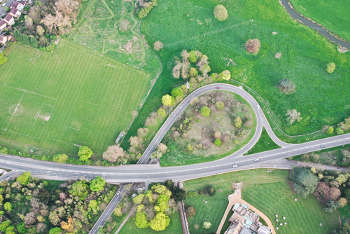The transport sector will face increasing levels of scrutiny and more legal action over large carbon-intensive infrastructure schemes, a senior figure at Friends of the Earth has predicted.
Mike Childs, head of science policy and research at the environmental group, suggested the sector was in for a difficult time if it tried to 'get away' with carbon-heavy projects, pointing out there 'is a legal requirement to reduce our emissions'.
'We have seen that over the [Highways England] roads programme,' he told delegates at the Chartered Institution of Highways and Transportation's (CIHT) spring conference.

An A road in England's green and pleasant land
The Transport Action Network has brought a case against Highways England’s second Road Investment Strategy on the grounds that it does not meet the UK’s obligations to reduce carbon emissions.
Legally binding commitments such as the Paris Agreement mean the Government has to show consideration for carbon reduction targets and, in 2019, the Government passed legisation to require the UK to bring all greenhouse gas emissions to net zero by 2050, compared with the previous target of at least 80% reduction from 1990 levels.
Mr Childs said: 'Increasingly, with very exacting reduction targets, it is going to be hard to build high carbon infrastructure and "get away with it", if you like.These things will be challenged on the way forward. But hopefully, that will be a temporary thing while everyone gets their head in the right space to say no actually this is the path we want to go down, not the old path.'
His comments follow an investigation by our sister publication, Highways, which shows that legal costs have dramatically risen in the last five years alone for national transport bodies.
The Government is now looking into potential reforms of the judicial review system, after launching a review last July.
In the wake of controversies over low traffic neighbourhoods and increasing amounts of cycle infrastructure, Mr Childs suggested a much greater level of direct involvement from the public could help.
'We need to make hard choices, and with hard choices comes the need to take the public alongside, which probably does mean more participatory decision-making; citizen's assemblies and citizen's juries in those difficult areas like restricting travel in neighbourhoods. Even building cycleways can be controversial.'
Mr Childs also highlighted that the UK was in a much luckier position with regards to the political consensus on climate change than other comparable nations such as America and Australia, where there was far more division. This made it easier to make more bold transport planning decisions, he argued.
His own 'dream', he said, was a major return to urban tram networks with every town and city over 150,000 in population mapping out new tram networks.
In his speech to CIHT delegates, Mr Childs focused on the need to act as quickly as possible to tackle climate change to avoid sparking chain reactions that would result in rapid global warming, such as the melting of the polar ice caps.
He ended with a call to arms for the transport sector saying that vocal support for more sustainable interventions would help both politicians and the public.
'The challenge in delivery is about how quickly we can move and that is really difficult in local and central government circles, where wheels move slowly and it's difficult in an industry where skills have been build up in one area and you suddenly need to build them in different areas. The message to the government is: "This is a challenge but we are up for meeting that challenge and let's work with you."
'And that positive message from professionals gives Government at the national and local level the confidence to move forward, without that confidence they are always feeling exposed. The more professionals and scientists say we are up for change the more confidence it gives politicians to feel able to make that change in policy and funding terms.'
Register now for full access
Register just once to get unrestricted, real-time coverage of the issues and challenges facing UK transport and highways engineers.
Full website content includes the latest news, exclusive commentary from leading industry figures and detailed topical analysis of the highways, transportation, environment and place-shaping sectors.
Use the link below to register your details for full, free access.
Already a registered? Login